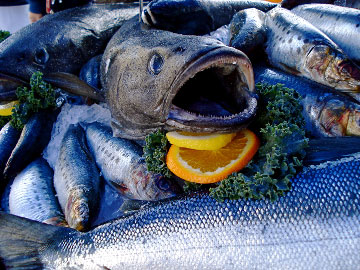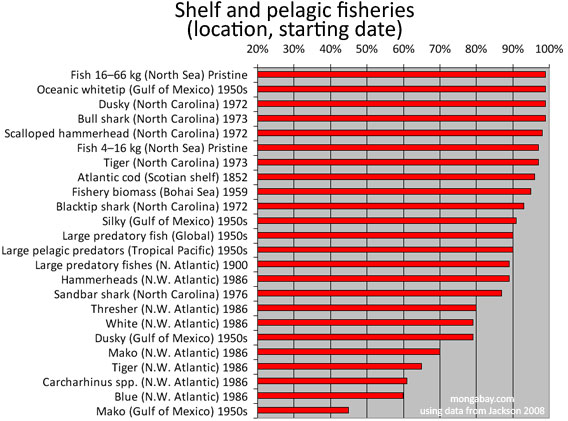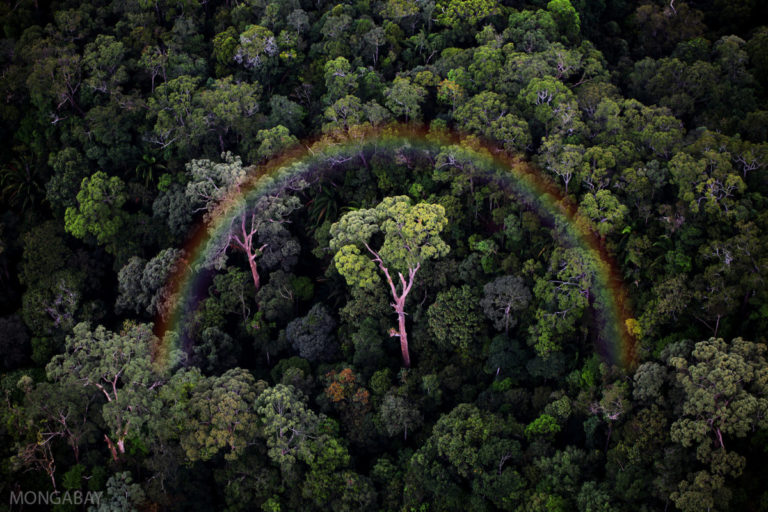A solution to worldwide fishery collapse?
A solution to worldwide fishery collapse?
Jeremy Hance, mongabay.com
September 18, 2008
In November 2006 a study on global fisheries received a lot of attention: employing 53 years worth of fishery data, Boris Worm predicted that by 2048 the ocean would be empty of fish. Essentially there would be nothing left to catch. Already, Worm reported, fishing stocks had collapsed in 29 percent of the world’s fisheries. Although scientists called for rapid and overhauling changes to fisheries, the fishing industry carried on business-as-usual. Now, two years later, a study in Science proposes to have found the solution to the global fishery-collapse.
The study, “Can Catch Shares Prevent Fisheries Collapse?", proves that a controversial management strategy for fisheries called “catch shares” may be the answer for preserving fish stocks. As opposed to “open access” fisheries—the normal catch-all-you-can system—the catch share initiative grants each fishermen a fixed percentage of the fishery’s total allowable catch. Such shares can be bought and sold like stock in a corporation. As the fish population recovers and the total allowable catch is raised, the price of each share goes up. Instead of simply catching fish from one day to the next, catch shares are built to make shareholders keep a constant eye on the future health of the fish population.
 A sablefish (Anoplopoma fimbria, commonly known as Alaskan black cod) beckons seafood lovers at the Wild B.C. Seafood Festival in Steveston, British Columbia. Managed under Individual Transferable Quotas (ITQs) in the Gulf of Alaska since 1990, fishermen are now catching the same amount of sablefish using approximately 40% fewer hooks in the water. [Note: Sharing the display with the sablefish is a salmon (foreground) and several sardines (left and right sides), neither of which are managed under ITQs. Suhzn, Flickr Creative Commons license |
"Under open access, you have a free-for-all race-to-fish, which ultimately leads to collapse," says lead author Christopher Costello, an economist at the Bren School of Environmental Science. "But when you allocate shares of the catch, then there is an incentive to protect the stock—which reduces collapse. We saw this across the globe. It's human nature."
Analyzing over 11,000 fisheries, the study found that fisheries practicing the open access system were twice as likely to collapse as those operating under catch shares. The researchers also found that catch shares are capable of reversing population decline in dwindling fish stocks. The longer the catch share program is in place the more the fish population improves.
"The difference is comparable to renting an apartment versus the house you own," says Costello. "If you own something, you take care of it—you protect your investment or else it loses value. But there's no incentive for stewardship when you don't own the rights to it."

Percent decline (biomass, catch, percent cover) for fauna and flora from various marine environments. Chart based on data from Jackson 2008. |
The scientists note that the catch share initiative also reduces bycatch, so long as a bycatch limit is incorporated into the system. Such a limit strongly encourages the fishery to adopt fishing gear and technology that mitigates bycatch and environmental damage.













